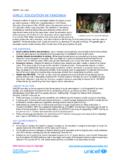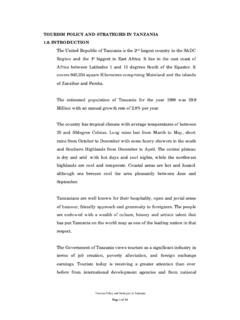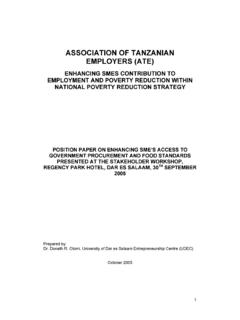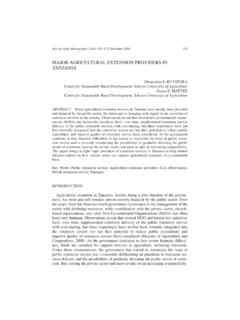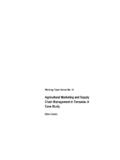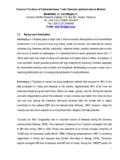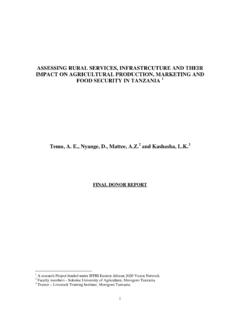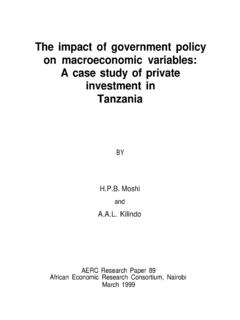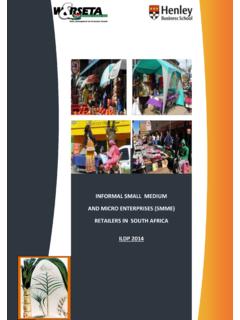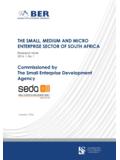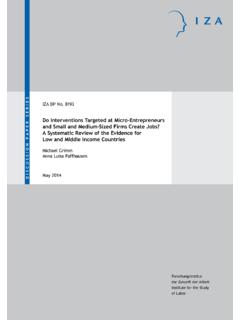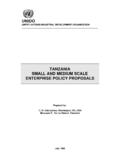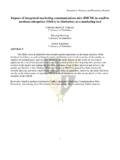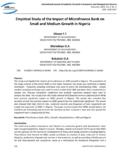Transcription of Small Business Entrepreneurship - …
1 Small Business Entrepreneurship inDar es salaam Tanzania:Exploring Problems andProspects for Future DevelopmentRashid M. Mfaume and Wilhelm LeonardEntrepreneurship, Small Business and CrimeDar es salaam1 Small Business Entrepreneurship inDar es salaam -Tanzania:Exploring Problems and Prospects for Future Development Rashid M. MfaumeAndWilhelm Leonard Institute of Public AdministrationMzumbe University 5 MzumbeTanzaniaAbstractSmall BusinessEntrepreneurshiphaves been seen as a hub in generating income for themajority of urban dwellers with no formal paid employment. In Tanzania, entry into Small businessentrepreneurship is usually not seen as a problem. One can start Small Business at any time and in any place. However, the development of this informal sector has been profoundly characterized by two parallel phenomena which are perhaps contradictory in character. One is the increasing politicization effort encouraging people to engage in Smalland Medium Entrepreneurship (SME).
2 This has led to the proliferation and mushrooming of Small Business most of which are in the form of petty trading, at least everywhere in the urban centres. The second is the parallel increase in events suggesting prevalence of crime and bureaucratic hurdles which affect SME and counter reaction from the Small traders. While the second can be characterized as due to the increasing repressive action by city authority over vendors, the counter reaction behaviour of itinerant and Small traders toward city authority is also evident in most urban areas. Generally, the sector is characterized by constant tension and feuds between Small traders and urban authorities. Drawing on research findings, the present paper challenges the possibility of reducing poverty in Tanzania using the strategy of developing the Small Business entrepreneurshipunder the situation where there is an increasing level of petty crime and bureaucratic hurdles.
3 It is argued and indeed, concluded that if the present intricate andcontroversialsituation surrounding SME and Small Business is not reversed, if not brought to rest, the development of SME is on slippery slope. The option suggested to tame the conundrum includes, developing discourse portfolio between Small traders and bureaucratic authority and authorities formulating policies that can promote development of Small : Entrepreneurship , Crime, Small Business , abject poverty, Bureaucratic malice Initial research upon which this paper is based was conducted jointly by the author of the present paper and Mr. Wilhelm Leonard of Mzumbe University. The author is grateful to Entrepreneurship and Small Business Research Cluster Mzumbe University for supporting the initial study; also the anonymous referees for their constructive comments for improvement of this paper. Correspondence to: Rashid Mfaume, L ecturer, Institute of Public Administration.
4 Mzumbe University: Box 5 Mzumbe Tanzania, Email: Small Business and CrimeDar es the past fifteen years, Tanzania has embarked on an ambitious and long process of economic, social, and political reforms to improve the Business environment and to increase economic growth and reduce poverty. In the past five years, despite adverse weather conditions and deteriorating terms of trade, the economy of Tanzania has been growing at an annual average rate of more than 4% (UNDAF, 2002-2006). For example in 2003, the economy grew by in real terms. Inflation had been reduced to byMarch, 2004 (Budget speech, 2004/2005). The balance of payments position has also improved substantially with foreign exchange reserves rising and maintained at asustainable level (UNDAF, 2002-2006). Despite all these success stories, the challenge facing the government of Tanzania is to translate these achievements into tangible human development.
5 The depth and extent of poverty is still high with 50% of the population living below poverty line (ibid). The task of reducing poverty and improving the living standardsof the Tanzanian population is huge. The rate of growth of national economy has not been high enough to generate the number of jobs brings up the issue of themajority to enter into private sector in the form of Entrepreneurship and Small Business , thus expanding the private and informal sector of the economy from in 1971 to in 1996. Correspondingly, the share of Public sector in the economy decreased from in 1971 to in 1996. At the same time the share of Public Sectoremployment in the formal sector increased from 23% in 1984 to 65% in the fact that Tanzania is one of the most rapidly growing population and urbanizing countries in Africa, with total population of million people, annual population growth rate of and urban population growth rate of per annum (National census,2002), the implications of this rapid population growth are enormous.
6 Firstly, young people will shortly constitute two thirds of the country s urban population. The entry into labour markets is expected to more than double, thus causing a further strain on already worsening unemployment situation. It is estimated that the number of new entrants to the labour force is between 600,000 and 700,000 annually, comparing unfavourably with the less than 300,000 new jobs that are created each year, most of them generated by Entrepreneurship , Small Business and CrimeDar es salaam3informal sector (UNDP, 2003). According to the last labour force survey of 1991, theunemployment rate was (UNDP, 2002; Bureau of Statistics, 1999). Theretrenchment exercise and the collapsing of most state enterprises that have thrown most energetic people out of sustainable and reliable income all add to the problem ofunemployment. It is the fact of the day that majority of retrenches remain in town trying to pursue other means of earning income.
7 They resort to self-employment ventures in the form of Entrepreneurship and Small Business . Agricultural sector, according to official data, provides employment for four-fifth of thelabour force. However, as both United Republic of Tanzania and World Bank admit, the performance of agricultural sector has been sluggish in the past decade and virtually stagnant. The level of growth achieved during the last decade is certainly notcommensurate with the huge potential in agriculture (ASDS, 2001). The levels ofagricultural growth achieved during the last decade are too low to pull the majority of the rural poor out of abject poverty. Instead, they serve to perpetuate the existing pervasive poverty among the farming communities (ibid). The cumulative resultant outcome is that the sector is unattractive especially to young people, and when lack of other social services in rural areas are added, the rural-urban migration increases and reluctance of people tomigrate from urban to rural areasbecomes high.
8 Secondly, the excessivepopulation is expected to live in overcrowded slum and squatter settlements, characterized by inadequate infrastructure and services, low security system, thus harbouring crime and violent practices. What is apparent is that the question of Entrepreneurship , smallbusiness and crime in urban centres presents a long standing conundrum at least recently when there is high prevalence of poverty. The proliferation of crime has been fuelled by severalissues including raising the level of unemployment and underemployment among young people (see later sections in this paper). The purpose of thispapertherefore isthree fold. Firstly it present some empiricalevidence, albeit, in a nutshell, of the prevalence and impact of crime on Entrepreneurship and Small Business based on the findings of the exploratory study conducted in the city of Dar es salaam. Secondly, it gives inductive discussion on the magnitude, forms of crime Entrepreneurship , Small Business and CrimeDar es salaam4and how it impacts on Small Business in Tanzania.
9 The thirdly is to highlight some Policy implications of the crime situation and how we can forge macro micro linkage as a strategy for poverty reduction. The central argument of the paper is that, high prevalence of petty crimesurrounding informal sector particularly Small businessis problems that can frustrate the growth of informal sector and even making the vision of poverty reduction foil. Also we note the difficulty of drawing clear boundary between repressive acts ofbureaucrats (city law enforcers) on theone hand andthe acts of Small businessproprietors on the other hand. Again, we question the possibility of Tanzania eradicating poverty by year 2025 as envisioned in the country s development vision 2025,under thepresent situation where Macro Micro linkage is very minimal. As we unearth theproblems inflicting the sector, we also note some strategic options to bring the constraining problems to rest and also suggest Policy oriented action to make the Small Business sector to paper is divided in five main parts.
10 This introduction is the first part. In the second andthird part we present general and normative description of the past and recent intricacies of crime and petty trading in Dar es salaam. The intention here is to try to give some chronological insights, albeit briefly,into empirical facts underpinning crime andentrepreneurship in our urban centres. It can depicted that all along the linkage of macro and micro enterprises is very minimal, with micro regarded as just endeavour for poor people and those with no education. In thefourth part, presents some theoreticalconceptualization and analytical framework. The fifth part is context, methodology thatunderpinned the main study The sixth part presents various empirical evidences and discusses the implications of the high prevalence of crime and its impact onentrepreneurship and Small Business . This again gives us an insight into bureaucraticbehaviours andhow the official authority conceives of the issue ofcrime andentrepreneurship and Small Business development in context.
